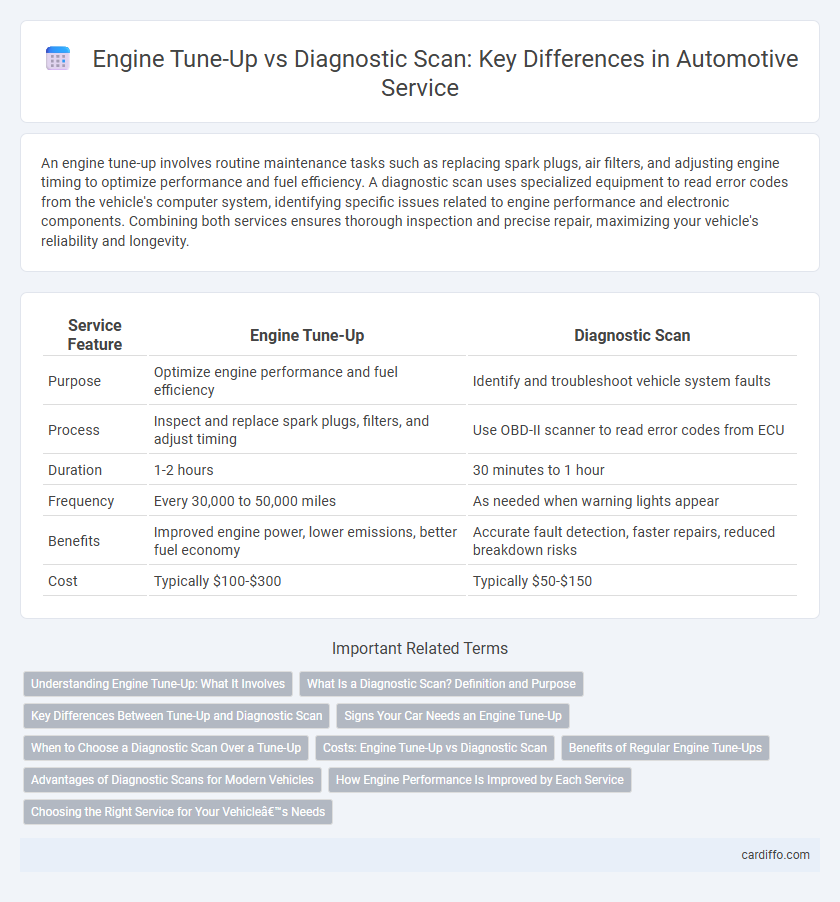An engine tune-up involves routine maintenance tasks such as replacing spark plugs, air filters, and adjusting engine timing to optimize performance and fuel efficiency. A diagnostic scan uses specialized equipment to read error codes from the vehicle's computer system, identifying specific issues related to engine performance and electronic components. Combining both services ensures thorough inspection and precise repair, maximizing your vehicle's reliability and longevity.
Table of Comparison
| Service Feature | Engine Tune-Up | Diagnostic Scan |
|---|---|---|
| Purpose | Optimize engine performance and fuel efficiency | Identify and troubleshoot vehicle system faults |
| Process | Inspect and replace spark plugs, filters, and adjust timing | Use OBD-II scanner to read error codes from ECU |
| Duration | 1-2 hours | 30 minutes to 1 hour |
| Frequency | Every 30,000 to 50,000 miles | As needed when warning lights appear |
| Benefits | Improved engine power, lower emissions, better fuel economy | Accurate fault detection, faster repairs, reduced breakdown risks |
| Cost | Typically $100-$300 | Typically $50-$150 |
Understanding Engine Tune-Up: What It Involves
Engine tune-up involves a comprehensive maintenance process to optimize engine performance, including spark plug replacement, air filter cleaning, and fuel system inspection. This preventative service enhances fuel efficiency, reduces emissions, and ensures smoother engine operation. Unlike a diagnostic scan that identifies specific fault codes, a tune-up addresses overall engine health through routine component adjustments and replacements.
What Is a Diagnostic Scan? Definition and Purpose
A diagnostic scan is an advanced service procedure using specialized tools to read and interpret error codes from a vehicle's onboard computer system (OBD-II). The purpose of a diagnostic scan is to identify specific issues affecting engine performance, emissions, and other critical systems, enabling precise troubleshooting and repair. This technology-driven approach helps mechanics detect problems like sensor failures, misfires, or emission control malfunctions efficiently.
Key Differences Between Tune-Up and Diagnostic Scan
Engine tune-up involves replacing spark plugs, air filters, and fuel filters to enhance engine performance and fuel efficiency, while diagnostic scan uses computerized tools to detect and identify engine glitches or sensor malfunctions. Tune-ups focus on maintaining and optimizing engine components through scheduled maintenance, whereas diagnostic scans provide real-time data analysis to pinpoint specific mechanical or electronic issues. Understanding these differences helps in selecting the appropriate service for either preventive care or troubleshooting vehicle problems.
Signs Your Car Needs an Engine Tune-Up
Frequent misfires, rough idling, and reduced fuel efficiency are key signs your car needs an engine tune-up. A drop in acceleration performance and persistent check engine light warnings also indicate the need for a comprehensive engine assessment. Identifying these symptoms early ensures optimal engine health and prevents costly repairs.
When to Choose a Diagnostic Scan Over a Tune-Up
Choose a diagnostic scan over an engine tune-up when your vehicle exhibits specific warning signs such as the check engine light turning on, unusual engine noises, or performance issues like stalling or rough idling. Diagnostic scans use advanced OBD-II technology to identify precise error codes and sensor malfunctions, allowing targeted repairs. This approach ensures timely detection of underlying problems, preventing costly damage and maintaining optimal engine efficiency.
Costs: Engine Tune-Up vs Diagnostic Scan
Engine tune-up costs typically range from $100 to $300, depending on vehicle type and parts replaced, while diagnostic scan prices generally fall between $50 and $150, influenced by the scan tool and technician expertise. Tune-ups involve labor-intensive procedures such as spark plug replacement and fuel system cleaning, justifying higher expenses compared to diagnostic scans focused on electronic system assessment. Understanding cost differences helps vehicle owners decide based on maintenance needs and budget constraints.
Benefits of Regular Engine Tune-Ups
Regular engine tune-ups improve fuel efficiency, reduce harmful emissions, and extend engine lifespan by ensuring optimal performance of all components. These tune-ups can detect minor issues before they escalate into costly repairs, enhancing overall vehicle reliability. Consistent maintenance through tune-ups promotes smoother acceleration and better engine responsiveness, contributing to safer and more economical driving.
Advantages of Diagnostic Scans for Modern Vehicles
Diagnostic scans provide precise identification of engine malfunctions by accessing the vehicle's onboard computer systems, enabling targeted repairs that reduce guesswork. Modern vehicles equipped with advanced electronic control units (ECUs) benefit significantly from diagnostic tools capable of interpreting complex fault codes, improving repair accuracy and efficiency. This technology enhances preventative maintenance by detecting issues early, minimizing costly breakdowns and extending engine lifespan.
How Engine Performance Is Improved by Each Service
Engine tune-up enhances engine performance by optimizing ignition timing, replacing worn spark plugs, and adjusting fuel systems to ensure smooth combustion and increased power output. Diagnostic scans improve engine efficiency by identifying error codes from the vehicle's onboard computer, allowing precise detection of issues like sensor failures or emission problems. Together, these services maximize fuel economy, reduce emissions, and restore optimal engine responsiveness.
Choosing the Right Service for Your Vehicle’s Needs
Engine tune-ups improve overall vehicle performance by replacing worn parts such as spark plugs, air filters, and fuel filters, ensuring optimal engine efficiency and fuel economy. Diagnostic scans identify specific issues by using advanced computer systems to read error codes, providing precise information needed for targeted repairs. Selecting the right service depends on the vehicle's symptoms; choose an engine tune-up for routine maintenance and improved performance, or a diagnostic scan for troubleshooting warning lights and engine irregularities.
Engine Tune-Up vs Diagnostic Scan Infographic

 cardiffo.com
cardiffo.com